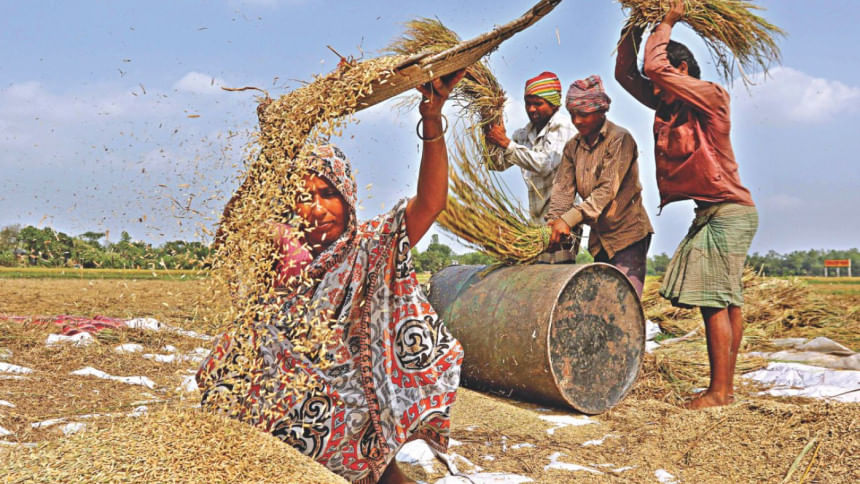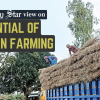Good yield of Boro likely

Farmers in most parts of the country have started harvesting Boro paddy with high hopes of getting a better price this season.
Their expectations were buoyed by a recent government promise to buy grains directly from the growers, not from the middlemen or millers.
Though Boro paddy was farmed on 48 lakh hectares of land last year, the acreage has shrunken to 46.85 lakh hectares this year, mainly due to low price last year. Besides, there has been some flash flood-induced crop losses early in the harvesting season in the northeastern haors.
Agriculture officials, nonetheless, are optimistic about achieving a bumper Boro output of 1.9 crore tonnes. If that happens, the total rice production this fiscal year would go a little over 3.47 crore tonnes, equalling the previous year's output.
Of the three rice seasons in Bangladesh, Boro is the biggest contributor to the staple production in the country. The other seasons are Aus and Aman.
Taking the shrunken Boro acreage into consideration, the US Department of Agriculture (USDA) projects Bangladesh's total Boro output to be 1.86 crore tonnes in the current season.
Upon return from the haor regions early this week, top officials of the agriculture ministry confirmed to The Daily Star that the flash floods caused significant damages to 22,000 hectares of Boro crop but it would not affect the national output much.
In a major policy shift, the government this year has decided to procure seven lakh tonnes of Boro paddy directly from farmers, in addition to six lakh tonnes of rice, from May 5 through August 31. The prices have been fixed at Tk 23 a kilogram of paddy and Tk 32 a kg of rice.
According to government estimates, farmers' production costs for each kg of paddy and rice have been Tk 20.70 and Tk 29 respectively.
In the previous years, the government used to buy mostly rice (9/10 lakh tonnes) and barely one lakh tonne of paddy, which would benefit mainly the rice millers and middlemen with the price incentives.
It's a challenging task to break free from the clutches of middlemen, said Abdul Wadud, MP, chairman of the parliamentary standing committee on the food ministry.
"[But] we have advised the food ministry to develop a mechanism so that farmers can directly go to the government's food procurement centres and get the price benefits," he told this correspondent yesterday.
Officials at the food ministry and the food directorate say that they will make public announcements in all rice-growing regions from May 2, encouraging farmers to sell their paddy to government granaries.
Thanks to the government announcement of the paddy procurement package, markets have already started showing an early sign of rise in the otherwise dampened rice prices, farmers in some of the rice-rich districts said yesterday.
Abdul Jalil grew Boro on 20 bighas (little over 8 acres) of land in Naogaon's Niamatpur.
As he has just started harvesting the crop, he is delighted to have 22 to 24 maunds of paddy per bigha.
Contacted over the phone yesterday, Jalil said, "The prices are gradually picking up. The price of a maund of paddy was Tk 700 last week. Today, it has risen to 730."
While he welcomed the government move of buying paddy directly from farmers, he was a little sceptic about it as well, noting that there exists a long nexus of dishonest middlemen and some unscrupulous food officials.
However, that the government will buy 13 lakh tonnes of rice and paddy at good prices would definitely have positive impacts on the rice market, Jalil added.
Discouraged by the low price last year, Tajamul Haque from Chapainawabganj's Nachol cultivated Boro on half the land he did last year.
"Farmers like me will definitely feel encouraged to grow more rice again if the government really purchases paddy directly from the growers," he said.
Speaking on condition of anonymity, an official of the Food Planning and Monitoring Unit (FPMU) of the food ministry said the government officials concerned have to deliver this time and try to implement the "direct-purchase-from-farmers policy".
Otherwise, the farmers will lose interest in farming the economically less lucrative rice, they noted.

 For all latest news, follow The Daily Star's Google News channel.
For all latest news, follow The Daily Star's Google News channel. 







Comments